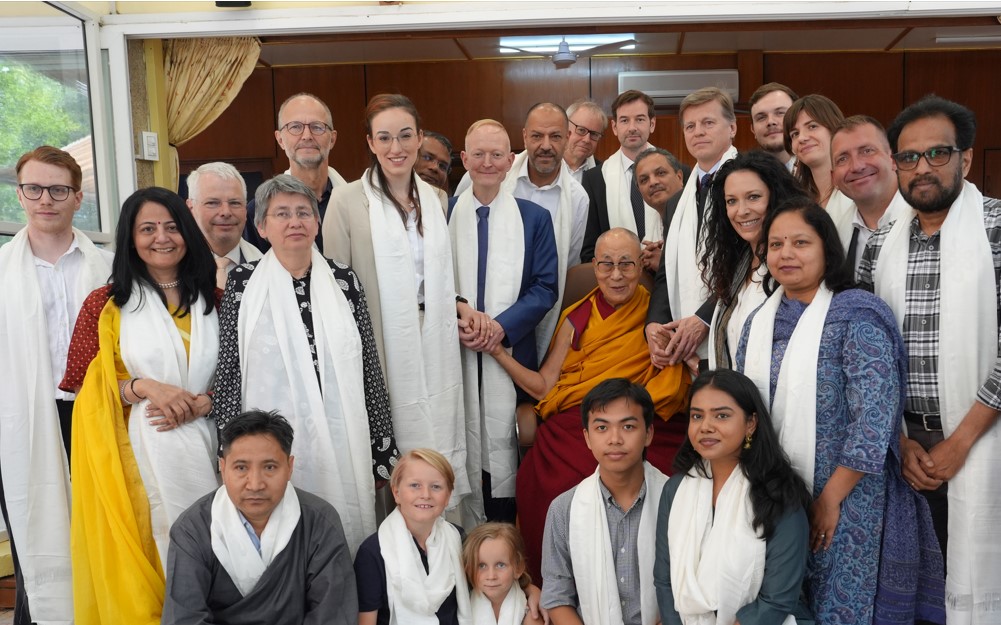Bridging Continents Through Dialogue: European Delegation’s Visit to Dharamshala
Bridging Continents Through Dialogue

Study tour to democratic institutions in South Asia and Europe continues to serve as a vital platform for building connections between the two continents. The Friedrich Naumann Foundation for Freedom (FNF), South Asia, has been at the forefront of organizing such initiatives, promoting mutual understanding, business dialogue, and shared liberal democratic values. The recent FNF study tour to Dharamshala, held from 27-30 April 2025, was one of such notable events bringing together Members of the European Parliament, representatives from civil society, cultural institutions, local government officials, members of the business community, journalists, and researchers. The four-day program offered not only a comprehensive exploration of democratic practices, cultural exchange, and policy dialogue in the unique context of Dharamshala but also embarked on a deep personal reflection.
The delgation’s first encounter was with the regional government of Himachal Pradesh. Minister Gokul Butail’s candid conversation about the political and economic scenario in Himachal Pradesh; and specifically on economic of local tea plantations, opened a window into how livelihoods are deeply tied to both tradition and policy. His reflections weren’t abstract—they were grounded in the real-world difficulties of sustaining agriculture in an increasingly competitive, globalized and climate-stressed world. Equally thought-provoking was our visit to the District Police Headquarters in Kangra, where officials described their dual responsibility: safeguarding the peace for both local residents and the Tibetan refugee community. Their stories echoed a broader theme of the visit—how institutions adapt to diverse populations while preserving social harmony.
But the emotional and philosophical centrepiece of our journey was our audience with His Holiness the 14th Dalai Lama. In a world rife with polarization, his calm yet powerful emphasis on compassion and nonviolence was a timely reminder of what true leadership looks like. The political structure of the Tibetan community in exile was another area of deep engagement. Conversations with Deputy Speaker Dolma Tsering Teykhang and Acting Sikyong Dolma Gyari brought into focus how the Tibetan Parliament-in-Exile functions not just as a symbol, but as a functioning democratic entity. Their work underscores issues related to the Tibetan cause, human rights, and the preservation of Tibetan culture and environment and broader questions about democracy.
The delegation also visited the Tibetan Children’s Village (TCV), where they were introduced to the school’s commitment to providing education and preserving Tibetan identity among younger generations. Few moments were as heartwarming—or as fun—as our spontaneous basketball match with the TCV students, a game played barefoot on hard concrete that left a few of us with sore feet but full hearts.
Other stops—at the Tibetan Medical and Astrological Institute, the Tibet Policy Institute, and the Library of Tibetan Works and Archives—offered glimpses into the intellectual and spiritual wealth of Tibetan culture. These institutions are not simply preserving the past; they are actively shaping the future by providing knowledge, healing, and policy frameworks that engage with the modern world while honouring ancient traditions.
The evenings were no less inspiring. A cultural performance at the Tibetan Institute of Performing Arts (TIPA) mesmerized the delegation with its elegance and storytelling. Watching those cultural performers, it became clear: Tibetan culture is not just surviving—it is thriving in exile with full of passion and a deep sense of identity. In his address at the event, Dr. Carsten Klein, Regional Director of the FNF South Asia, emphasized the importance of institutions like TIPA in safeguarding Tibetan culture and spiritual traditions. Echoing this sentiment, Austrian MP Mr. Viet Dengler and Baden-Württemberg MP Ms. Alena Fink expressed solidarity with the Tibetan people and underscored the significance of resilience in their ongoing struggle for human rights, dignity, and freedom.
As the tour concluded with a skywalk between McLeod Ganj and Dharamshala and a serene visit to the Norbulingka Institute, there was a sense among us that this journey had been transformative. Not only did it deepen our understanding of the Tibetan cause, but it also strengthen ties between Europe and South Asia and reaffirmed a shared commitment to democratic values, cultural exchange, and the support of human rights across borders. Dharamshala reminded us that democracy is not defined by mere geography—it is defined by spirit. And that spirit, in the hills of Himachal Pradesh, remains unbroken.
Media Coverage:
